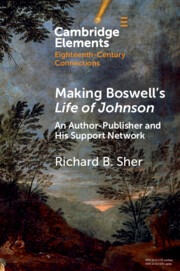2 results

Making Boswell's Life of Johnson
- An Author-Publisher and His Support Network
-
- Published online:
- 28 July 2023
- Print publication:
- 24 August 2023
-
- Element
- Export citation
Chapter 8 - Johnson, Race, and Slavery
-
-
- Book:
- The New Cambridge Companion to Samuel Johnson
- Published online:
- 22 September 2022
- Print publication:
- 29 September 2022, pp 108-120
-
- Chapter
- Export citation


